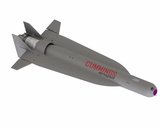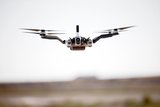Adaptive Materials successfully powers robot
Adaptive Materials, the leading innovator in portable solid oxide fuel cell technology, recently completed successful testing of its hybrid system for small ground robots, a key milestone in the company’s 2-year project.
With support from the Defense Advanced Research Projects Agency (DARPA), Adaptive Materials has proven that its fuel cell system can power small robots across various terrains while the robot conducts surveillance and other mission-critical operations.
The proof of concept testing, which took place at the independent Southwest Research Institute, included testing an iRobotPackBot, powered by an Adaptive Materials’ solid oxide fuel cell system, across a number of military relevant terrains. The PackBot was powered by a hybrid system that combined Adaptive Materials’ fuel cell system with a lithium battery to deliver unparalleled performance and duration.
“Adaptive Materials’ solid oxide fuel cell system helps achieve maximum potential for small robots,” explain Michelle Crumm, Adaptive Materials’ chief business officer. “Lightweight, convenient and powered by globally-available propane, Adaptive Materials fuel cells improve the overall functionality and duration of a robot in mission-critical settings.”
Today the U.S. Army and other armed services have deployed thousands of unmanned systems to disarm improvised explosive devices from a safe distance. The increased run time possible with an Adaptive Materials hybrid fuel cell system could open the door for additional missions.
Adaptive Materials is working to deliver a fuel cell system for small ground robots that will power the vehicle for more than 12 hours at a time. This increased duration of operations will enable the robots to have longer endurance during missions.
These robots also have potential to assist first responders and others in disaster zones search debris and complete tasks that would put people in harm’s way.
More from Uncrewed Vehicles
-
![Cummings Aerospace showcases Hellhound loitering munition designed for US Army’s LASSO programme (video)]()
Cummings Aerospace showcases Hellhound loitering munition designed for US Army’s LASSO programme (video)
Cummings Aerospace presented its turbojet-powered Hellhound loitering munition at SOF Week 2025, offering a man-portable solution aligned with the US Army’s LASSO requirements.
-
![SOF Week 2025: PDW unveils attritable FPV drone for SOF operations at scale]()
SOF Week 2025: PDW unveils attritable FPV drone for SOF operations at scale
PDW has revealed its Attritable Multirotor First Person View drone at SOF Week 2025, offering special operations forces a low-cost, rapidly deployable platform for strike and ISR missions, inspired by battlefield lessons from Ukraine.
-
![SOF Week 2025: Teledyne FLIR white paper provides guidance on reusable loitering munitions]()
SOF Week 2025: Teledyne FLIR white paper provides guidance on reusable loitering munitions
Teledyne FLIR is highlighting the emerging requirements for 'recoverable and re-usable' loitering munitions across the contemporary operating environment during this week’s SOF Week conference in Tampa, Florida.
-
![SOF Week 2025: Kraken Technology group debuts K3 Scout USV in North America]()
SOF Week 2025: Kraken Technology group debuts K3 Scout USV in North America
High-performance maritime industry player Kraken Technology Group, based in the UK, has used the SOF Week conference in Tampa, Florida this week to debut its K3 Scout uncrewed surface vessel (USV) to the North American market.
-
![Palladyne AI and Red Cat to demonstrate capabilities for autonomous drone swarms to the US military]()
Palladyne AI and Red Cat to demonstrate capabilities for autonomous drone swarms to the US military
Red Cat and Palladyne AI recently conducted a cross-platform collaborative flight involving three diverse heterogeneous drones.
-
Jammer resistant drone designs spark search for countermeasures
The Russia-Ukraine conflict has driven another stage of evolution for drones and the counter measures to defend against them.
























